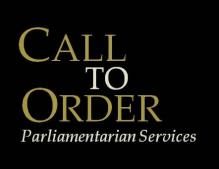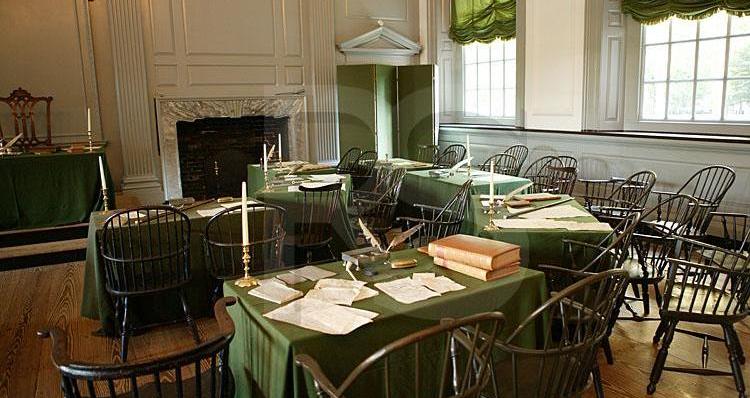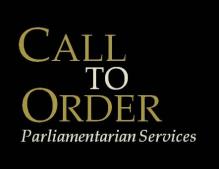In Mr. Smith Goes to Washington, the naïve Mr. Smith yields the Senate floor out of courtesy to a colleague, In doing so he loses his ability to debate on his legislation to prevent graft and corruption, Mr. Smith learned the hard way about the importance of knowing procedural rules. Officers and members of boards and and associations need to know the rules of order to achieve their goals and help their enterprises succeed. Our expertise includes:
- Meeting and Session Governance Services
- Presiding Officer Services
- Delegate Convention or Assembly Services
- Strategic Procedural Planning Services
- Bylaw Drafting, Review, and Revision Services
- Written Opinions Services
- Training Programs
Call out the sheriff! Legislators on the lamb!
Madison, WI -- Wisconsin Republican Governor Scott Walker needs to balance the budget, and he wants to do it by cutting spending and eliminating certain collective bargaining procedures of various government unions. His budget bill is being taken up by the Wisconsin State Senate where Republicans hold the majority of 19 to 14. But, fiscal bills require a quorum of three-fifths (60%) of the Senate members or 19.8 rounded to 20. Democrats have fled the state of Wisconsin to prevent a vote from being taken that they know they will lose.
The State Republican Senator Scott Fitzgerald made a motion for a call of the Senate. The motion for a call of the house in general parliamentary procedure requires, if adopted, the Sergeant at Arms lock to the doors of the assembly, after which a roll call is taken to find out who is present and more importantly who is absent without excuse. Those who are absent without excuse can be arrested and brought to the assembly. Generally, legislative bodies are the only types of assemblies that have the power to enforce a motion for a call of the the house. The Wisconsin State Senate has this authority. So now, 14 Democrat Senators are on the lamb and generally believed to be in Illinois.
The last time I can remember this happening was in Texas in 2004 when the Texas legislature was about to take a vote on the redistricting plan put together by the Republican controlled legislature. The Democrat members of the Texas legislature fled to Louisiana to prevent a quorum from being present and thereby stalling the plan from being implemented. (Needless to say, if the plan were implemented Democrats stood to lose some seats.) The Texas Rangers gathered up a posse to round up the fleeing legislators. You can't help but chuckle at the thought of a posse of Texas Rangers on horses chasing down those delinquent legislators!
The mere fact that a motion for a call of the house exists says something about us humans and the lengths that we're willing to go to have our way. Back at our nation's founding, one of the charges against King George in the Declaration of Independence was that "HE has called together Legislative Bodies at Places unusual, uncomfortable, and distant from the Depository of their public Records, for the sole Purpose of fatiguing them into Compliance with his Measures." Of course this was considered unfair. I wonder what the founders would say of the actions of either of the Wisconsin Democrats or the Texas Democrats?

© 2011 - 2016 Call To Order Parlimentarian Services
In the News
Independence Hall, Philadelphia,PA is where the Second Continental Congress debated and passed the Declaration of Independence, and where the Constitutional Convention debated and adoped the U.S. Constitution.

| Join Our Mailing List |
In Mr. Smith Goes to Washington, the naïve Mr. Smith yields the Senate floor out of courtesy to a colleague, In doing so he loses his ability to debate on his legislation to prevent graft and corruption, Mr. Smith learned the hard way about the importance of knowing procedural rules. Officers and members of boards and and associations need to know the rules of order to achieve their goals and help their enterprises succeed. Our expertise includes:
- Meeting and Session Governance Services
- Presiding Officer Services
- Delegate Convention or Assembly Services
- Strategic Procedural Planning Services
- Bylaw Drafting, Review, and Revision Services
- Written Opinions Services
- Training Programs
At the Republican Convention: House Rules or Robert’s Rules and perhaps a Dark Horse
What drama and intrigue! Will there be a contested convention? A brokered Convention? Will there be an attempt to nominate a dark horse (or white knight depending on your point of view) at the Convention?
This last question was on the minds of many pundits when a member of the Republican National Committee made a proposal last week to change the parliamentary authority identified in Rule 30 of the Rules of the Republican Party from the arcane Rules of the U.S. House of Representatives (House Rules) to the slightly less arcane rules of Robert’s Rules of Order.
First, it is standard operating procedure for most private associations to identify a parliamentary authority in its bylaws or rules. The parliamentary authority is only used when the bylaws or rules of an organization are silent. Items that fall into this category are specific motions, specific characteristics of motions and other procedural matters.
Under normal circumstances such a choice is completely uncontroversial, but the Republican Convention of 2016 will be nothing but controversial! One argument against the proposal is that some candidate or cohort of Republicans is attempting to “rig” the Convention in their favor by switching to Robert’s Rules. In fact good reasons exist that Robert’s Rules would make it more difficult to rig the Convention.
The Rules of the US House of Representatives are clearly established for a legislature that meets daily with a considerable amount of business and not for a delegate assembly of a private association that meets once every four years. The House deals with thousands of bills that sift through 21 different committees and 96 subcommittees not to mention dealing with the Senate and the President. In contrast the Republican convention has four Committees (which operate under Robert’s Rules), six subcommittees and makes but 6 decisions: it adopts 1) a Credentials Report, 2) a Rules and Order of Business Committee Report, 3) a Platform Committee Report, 4) a Permanent Organization Committee Report, 5) the Republican nominee for President of the United States, and 6) the Republican nominee for Vice President of the United States.
Using the House Rules for this is simply over kill. Further very few House Rules deal with matters of the Convention
But would a change from the Rules of the House of Representatives to Robert’s Rules make it easier or more difficult to nominate a dark horse? The answer is most definitely harder. Consider this scenario.
After the Chairman of the Convention announces Donald Trump and Senator Ted Cruz as nominees that have satisfied Rule 40(b), that is, they have demonstrated support from the majority of delegates from eight states, he would then declare nominations closed. Just then a delegate gains recognition and makes a point of order that nominations must be allowed from the floor.
Under Robert’s Rules of Oder Newly Revised 11th edition “[i]f no method of nominating has been specified in the bylaws and if the assembly has adopted no rule on the subject, any member can make a motion prescribing the method ….” p. 431. Since there is a Rule, Rule 40(b), that establishes the method of nominating a candidate, the Chairman has no choice and must overrule the point of order and proceed with voting on Mr. Trump or Senator Cruz.
Under the House Rules, it’s not so clear. The House Rules have no formal rules for nominations such as that in Robert’s Rules. There are only two areas where nominations are called for: to elect the Speaker and to elect committee members and the chairmen of committees. With no formal rules on nominations in the House Rules, the Chairman of the Convention may look to precedents and here he would find that nominations for Speaker have by tradition come from the floor from party caucuses.
Further, the Republican House caucus provides for nominations from the floor. Indeed, the Rules of the House Republican Conference (the Republican caucus) for the 114th Congress allows for nominations for Speaker to come from the floor. By the precedent in the House of allowing nominations from the floor through the caucuses and the Republican Conference itself allowing nominations from the floor, the chair could easily find the point of order well taken and allow nominations from the floor or an appeal could be made on these grounds to allow this to happen.
Oh the howls!
Of course, the counter argument is that Rule 30 allows only those House Rules that are applicable and not inconsistent with the Rules of the Republican Party. The floor fight would begin and he who hath more delegates would prevail.
Robert’s Rules of Order was designed and written for private associations with a limited amount of business to actually address. It was designed for delegate conventions just like the Republican Convention. The House Rules were designed for a wholely different purpose.
And lest anyone think that the scenarios described here is outside the pale, this is the exact process Senate Democrats used to change the filibuster rules on judicial nominations in 2013. See the article Senate changes cloture rule without changing the Rules.

In the News
Independence Hall, Philadelphia,PA is where the Second Continental Congress debated and passed the Declaration of Independence, and where the Constitutional Convention debated and adoped the U.S. Constitution.
